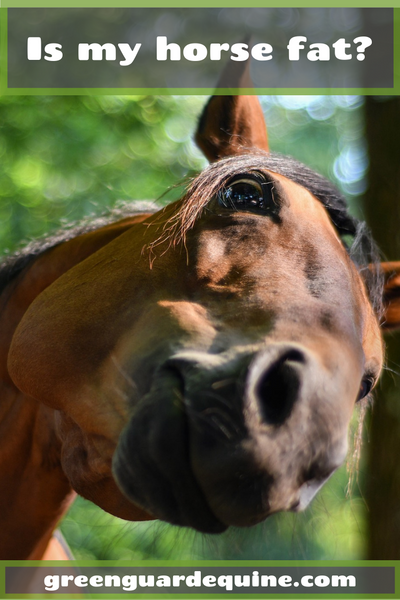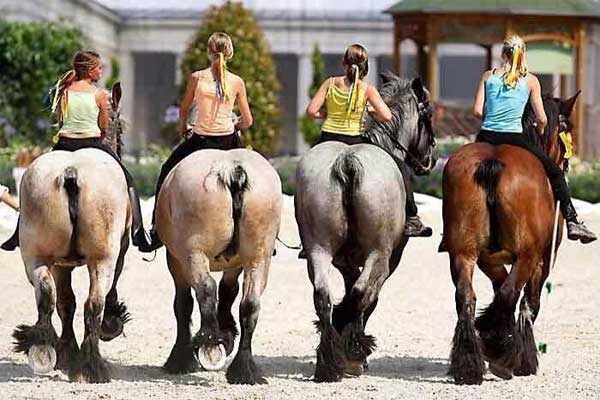
Do these humans make our butts look big? Via Pinterest.
How To Tell If Your Horse Is Overweight
Are you the kind of person that can’t resist sneaking your pony treats because she gave you “the look” and she’s just the cutest thing you ever did see? Have you ever thought your horse was looking great, only to have your vet tell you after a physical that he’s at least 100 pounds overweight? Do you insist on letting your horse roam in open fields when the smell of grass alone makes them gain an extra 50 pounds?
While we may have the best of intentions, chances are that we as horse lovers are doing more harm than good for our horses and their overall health when we indulge them in these ways. If we are lucky enough to see and interact with our horses on a regular basis, it can be hard to notice when they start getting chubby and putting on extra weight. How exactly can you tell if your horse is overweight? Glad you asked!
Learning how to use body score and weight tape are two things that can help you keep an eye on your horse’s weight before he goes full balloon on you.
Horse Body Score
The body score index, also known as the Henneke Scale, was created in 1990 by Texas A&M researcher Don Henneke. Using a scale from 1-9, it gives you a simple method to rate your horse’s body condition. This really amounts to an eyeball test, but is based on practical and observable physical markers. These include the state of a horse’s withers, the amount of fat between the ribs and shoulders, and the size of the neck. The average healthy horse should have an equine body condition score of between 5 and 6.
Horse Weight Tape
If a scale is not readily available, an inexpensive equine weight tape can be found at your local tack store. This goes up around their girth and the backside of the withers, and will give you an estimated weight for your horse. Even a tape measure can be used in a pinch and applied to the formula below.
- Heartgirth x Heartgirth = Y
- Y x Length = Total
- Total ÷ 330 = Approximate body weight
This will help give you a good idea of where your horse is, and whether you need to think about making dietary adjustments.
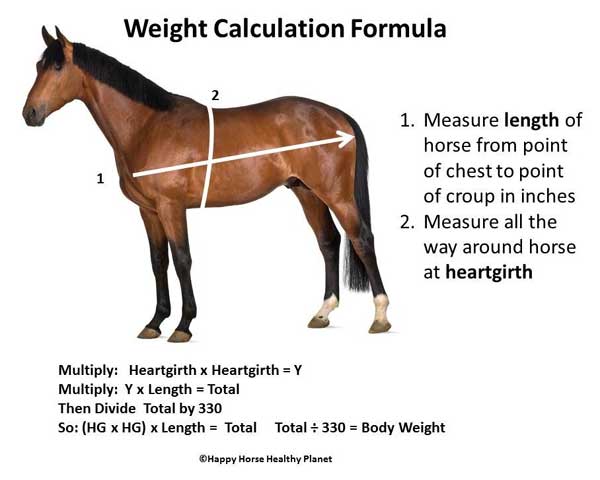
Horse weight calculation formula (via Happy Horse Healthy Planet / EcoEquine).
Causes of Obesity in Horses
How much your horse eats and how much he exercises are two things that you as a horse owner have some control over. Do you weigh your feed? It’s important to know how much your horse eats, follow feeding guidelines, and keep the horse on a regular schedule. Overfeeding is one of the main issues that causes obesity in horses and ponies. It’s also the easiest for you to manage.
A sedentary lifestyle may cause obesity in horses. Wild horses move as they look for food. Sometimes the food is lush and abundant, but they might have to travel miles to find it. Horses are meant to move, and yet many domestic horses are limited to fenced pastures and fields day after day.
The amount of exercise your horse gets on a weekly basis should also be taken into account. Keeping track of your horse’s eating and activity habits can also help you figure out if you should be maintaining his weight or helping him burn calories.
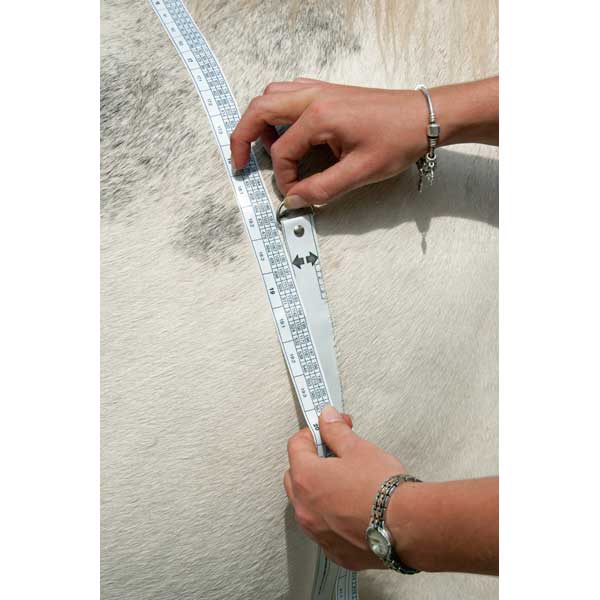
Weight tape is one method of determining if your horse is overweight. (Photo by Chelle 129 on Shutterstock)
If you’re following a feeding regimen carefully and still find your horse is packing on the pounds, your horse might have a genetic condition that causes him to be a little on the hefty side.
Overweight Horse Problems
A horse that starts out a little pudgy can blossom into full-on obesity pretty quickly. This can lead to all manner of serious health problems. If you notice your horse is starting to look a bit thick in all the wrong places, he needs to be watched carefully by you and your vet.
The longer your horse keeps on weight, the higher the risk he faces for life-altering diseases, pain, and the immense vet bills that come along with them once you seek treatment. Some of the most common health problems that are caused by horse weight gain include:
- Laminitis: when the soft laminae tissue in the foot starts to die due to lack of proper oxygen and blood flow.
- Founder: the rotation of the coffin bone caused by laminitis.
- Joint Problems: comparable to arthritis in humans, horses that are severely overweight over a period of time may start to have pain in their legs (specifically in the hocks and fetlocks)
- Insulin Resistance: similar to Type 2 Diabetes in humans.
- Metabolic Syndrome: a blanket term that covers a horse with more than one of the conditions listed above.
Treatment Options for Overweight Horses
How do you start to help your horse lose weight? First off, you should talk with your vet about what your horse needs. Try not to overreact and take your horse completely off of grain because they will miss out on some vital nutrients and vitamins. Finding the right balance to keep your horse at optimum health is key.
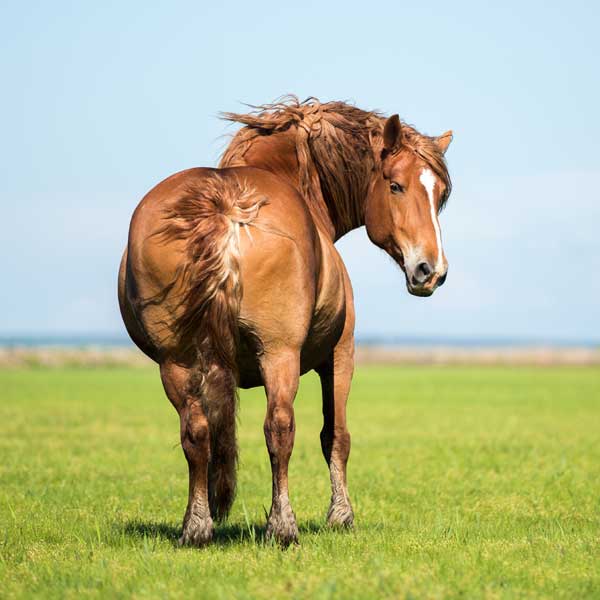
Overweight horses are at risk for any number of debilitating health issues. Photo via OlesyaNickolaeva on Shutterstock.
After talking with your horse’s vet, they may recommend one or more of the following treatment plans:
- Grazing Muzzle: a quality grazing muzzle can reduce grass intake by 30-70%, leaving your horse free to roam on open pasture, breathe without restriction, and eat and drink happily.
- Dry Lot: well-fertilized grass is very high in sugar and starch, which can be detrimental to an already overweight equine. Dry lots are most commonly small paddocks that are free of grass, where a horse is fed hay. This is a popular option, but the lot must be well-maintained to keep the flies down and the horses exercised.
- Paddock Paradise/Grazing Track: if you have the time, space, and money, the paddock paradise approach helps keep your horse moving and grazing without overeating and running down pastures.
- Exercise: ensuring that you keep your horse in a well-balanced exercise regimen is really important for the health and welfare of your horse. Three days a week of good physical activity for 20 minutes at a time can have a big impact on a horse’s metabolism and keep their heart and joints healthy.
What’s Next For a Horse That Needs To Lose Weight
If you suspect that your horse might be obese, there’s a good chance he already is. Take time to weigh, or at least make a reasonable estimate of your horse’s weight, compare his body condition score to the average, and make a plan. It might be your best time spent on improving your horse’s overall health.
